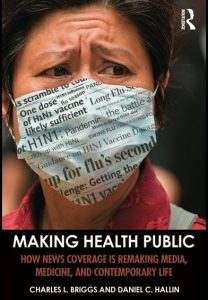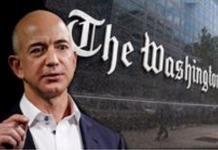 Journalists and other writers, including the e-book variety, rely constantly on fair use in quoting big shots such as Donald Trump.
Journalists and other writers, including the e-book variety, rely constantly on fair use in quoting big shots such as Donald Trump.
Without fair use, the collective IQ of the writers’ output would drop 20 points. Trumpian quotes may lower it, but what about words from other newsmakers and experts?
So, dear readers, what do you think of the New York Times gouging two professors a whopping $1,884 to pick up fewer than 300 words? Would that the NYT’s freelance rates be the same as those for permissions!
Writing for NiemanLab, Shan Wang says of the professors: “They’re outraged, and have taken to Kickstarter—in part to recoup the charges, but primarily, they say, to ‘protest the Times’ and publishers’ lack of respect for Fair Use.” You can donate here.
“The Times’ claim has no legal basis, and represents an arrogant rejection of the principle of fair use that is ironic for an organization that presents itself as a defender of freedom of expression,” say Professors Daniel C. Hallin of the University of California, San Diego, and Charles L. Briggs from UC, Berkeley.
According to the two, “We reduced the size of a number of quotations, but in the end there were three from the Times we couldn’t cut to 50 words without damaging the integrity of our scholarship.”
So “we ended up paying the Times’ $1,884 to reproduce three brief quotations totaling less than 300 words (the publisher said this represented a 20% discount on what the Times was originally asking).”
The professors say: “We could have paid this amount out of research funds from our University, but it seemed to us unethical to use taxpayer funds to subsidize a big media corporation and undermine a right that belongs to all scholars and the public in general. So we paid out of pocket (our advance on royalties for the book will be $800).”
Oh, to think of the price tag here if I’d been quoting the Times instead of NiemanLab and the two professors!
So why did Hallin and Briggs have to go to the Times in the first place? You’d hope that fair use would cover situations like this, and that Routledge, the professors’ publisher, wouldn’t have required permissions for the fewer than 300 words. Guess what they were writing? A book on the media’s health and medicine coverage—the very kind of project that that fair use should especially protect, if we apply guidelines that Wang cites from Peter Jaszi and Patricia Aufderheide. Alas, in the publishing industry, Routledge is hardly alone in its maniacal insistence on permissions.
Consider the free speech and general political repercussions, however, if Routledge, the Times, and other publishers of books and newspapers let fair use die.
Right now the billionaire class enjoys special access to the media, thanks to their legions of PR people as well as their ownership of so much of it. Now suppose we keep monetizing quotes. That won’t be the best of news for nonbillionaires and nonconglomerates writing and publishing books.
Keep in mind the crazy Donald’s hope of changing libels laws—far-fetched now, but maybe not in the long term if he and his ilk get into office and subvert our system sufficiently. You bet they’ll war against fair use, not just libel verdicts shaped by the famous New York Times Co. vs. Sullivan case.
While The Donald’s wrath is probably directed more at this point against Jeff Bezos and the Washington Post than against the New York Times, the NYT just might end up hoist on its on petard in regard to overdone monetization of quotes. No, the Donald scenario isn’t probable. But we still need to think of this in Strangelovian terms. As with global nuclear war, the scarier the possibilities the more we should be on our guard regardless of the unlikeliness of the worst happening.
Just as you might expect, the Times released a statement to Chan saying it’s pro-fair use and is simply worried about the costs of news-gathering. But practice is a different story. Given the corporate greed at work here along with perhaps a dash of hostility toward external criticism, may I put forth a modest proposal for what is normally one of my favorite newspapers? Drop the famous slogan “All the news that’s fit to print.” Change it to “All the news that’s fit to gouge for.”
































The NY Times is no doubt hurting for money and pursuing every source it can. That said, writers can make their demands for payment less easy to enforce. Make yourself harder to sue and you’ll almost certainly not be sued. The NY Times lawyers, in this case, will look, doubt they can win, and abandon the issue.
Don’t ask for permission to quote mere words. That only makes it look like you’re admitting you need it. Don’t even tell them what you’re doing. They may never find out.
Quote as little as possible. Quote only what’s absolutely necessary. If you’re quoting in context, and you should, then you don’t need the context. “Break up quotes,” when you write, “like this.” If something is said well in the source, don’t cheat by copying it at length. Do your own good writing.
Touch all the fair use bases, including reporting, scholarship and criticism. If you toss in criticisms of either the author or news source, you’re doing what those would not do and hence embellishing your fair use credentials.
I might add that, while I’m not a Trump fan, I do think we need to get rid of that ‘only malice makes it libel’ standard. We don’t have that for any other profession. If your surgeon botches your surgery, you need only prove incompetence not malice. I don’t see why journalism, alone among all the professions, should get away with such low standards. Essentially our courts have ruled that journalism is, as a matter of law, incompetent and devoid of genuine professional standards. I happen to believe that it true. But I also don’t think they should get away with that. If you don’t punish incompetence you get…. incompetence.
In those rape allegations against a University of Virginia fraternity, for instance, Rolling Stone didn’t make any effort to confirm the story’s sole source. It didn’t even contract her friends, who could have told it that what she said wasn’t to be trusted, that she routinely invented people and events. For that, Rolling Stone needs to pay and pay a lot.
Journalism has set itself up as a judge of everyone else. It needs to be held to standards much like those it wants to impose on others. If Joe’s Hamburger Stand can be sued in bankruptcy for not cooking a few burgers enough, and it can. Then the same should be true of major big city dailies and network television. They can be sued out of existence if they show similar incompetence.
And I might add that’ll be good for our political system It’s no so much a lying press that’s harming our nation. It’s a press that lies so one-sidely. Some groups have their crimes concealed. Other groups get trashed with lies. Here’s a recent illustration:
http://www.nationalreview.com/article/436153/katie-couric-gun-documentary-scandal-reality-tv-journalism
That’s just a lie, that’s a vicious, slanderous one. Katie Couric made it look like people who have good answers to her question had no answers. In a just world, Katie Couric and her so-called documentary team should spend years and years paying off their settlement to the Virginia Citizens Defense League. Instead, Couric is refusing to even edit that so-called documentary to make it accurate.
One final note. In a country where the press can and does routinely lie, the press loses all credibility. Millions of people have decided, quite legitimately, not to trust it. Much of Trump’s success lies in the fact that in recent presidental races the press has gone so far out of its way to attack decent people such as Sen McCain and Governor Mitt Romney, that much of the public simply ignores what the press says about Trump, whether than is true or not. And press credibility isn’t helped by the fact that Hillary has been getting away with all sorts of vile activities in the national arena since at least 1992 with the eager and active support of the national news media. There is, for instance, the nasty way she’s attacked women who have exposed her hubbies behavior as a sexual predator.
My own sense is that there’s a deep synergy between the two Clintons and the nation’s press for the most obvious of reasons. Two groups of chronic, pathological liars—the Clintons and the Big Media—find that they much in common with one another and thus support one another. Like attracts like.
SInce about 2000, I’ve known that the Internet had doomed the old mainstream stress. It’s ability to distort the news depended heavily on it being almost the sole source of news for most Americans. That’s no longer true. But I thought it’d die as a slow fade-out. That seems to not be the case. It’s dying like the boy who cried wolf, In 2008 and 2012 the Republican candidates were far better qualified than Obama but the press cried wolf. Now in 2016 the press is screaming “wolf, wolf, wolf” about Trump and only their fanboys are believing them. The rest look at their choices, Hillary and Trump, and shake their heads in disgust. “How did we come to this?,” they ask themselves.
And one reason why is that we’ve not held our press accountable for their lies and distortions. A lying press unaccountable for its actions is one of the chief reasons why Election 2016 is a horror of horrors.
Yet another good argument in favor of self-publishing. Publisher cowardice is at the rot of this story.
Mr. Perry, actual malice is not required for demonstrating libel. That applies only to libel for public figures. New York Times v. Sullivan is a major judicial decision and unlikely to be changed legislatively.
I have several disagreements with Mr. Perry’s comments. I am only somewhat familiar with the Couric brouhaha. The issue seems to be more about selective editing than libel. I think video news editor try their best to string together video clips around a narrative in a truthy way. But it’s often a gut judgment call which some do well and others do badly.
NYT’s response is awfully condescending. i.e., “If you’re too stupid not to know the difference between fair use and infringement, we will gladly accept your money for peace of mind.” The problem is, individuals and smaller publications don’t have a copyright attorney on retainer and they don’t have liability insurance. It’s fine for a company which has these resources to say that everyone should do due diligence.
I appreciate the link to the Set of Principles for Journalism.http://archive.cmsimpact.org/journalism If you can point to a publicly accepted set of principles for fair use and show compliance with it, perhaps that would be sufficient to convince a judge.